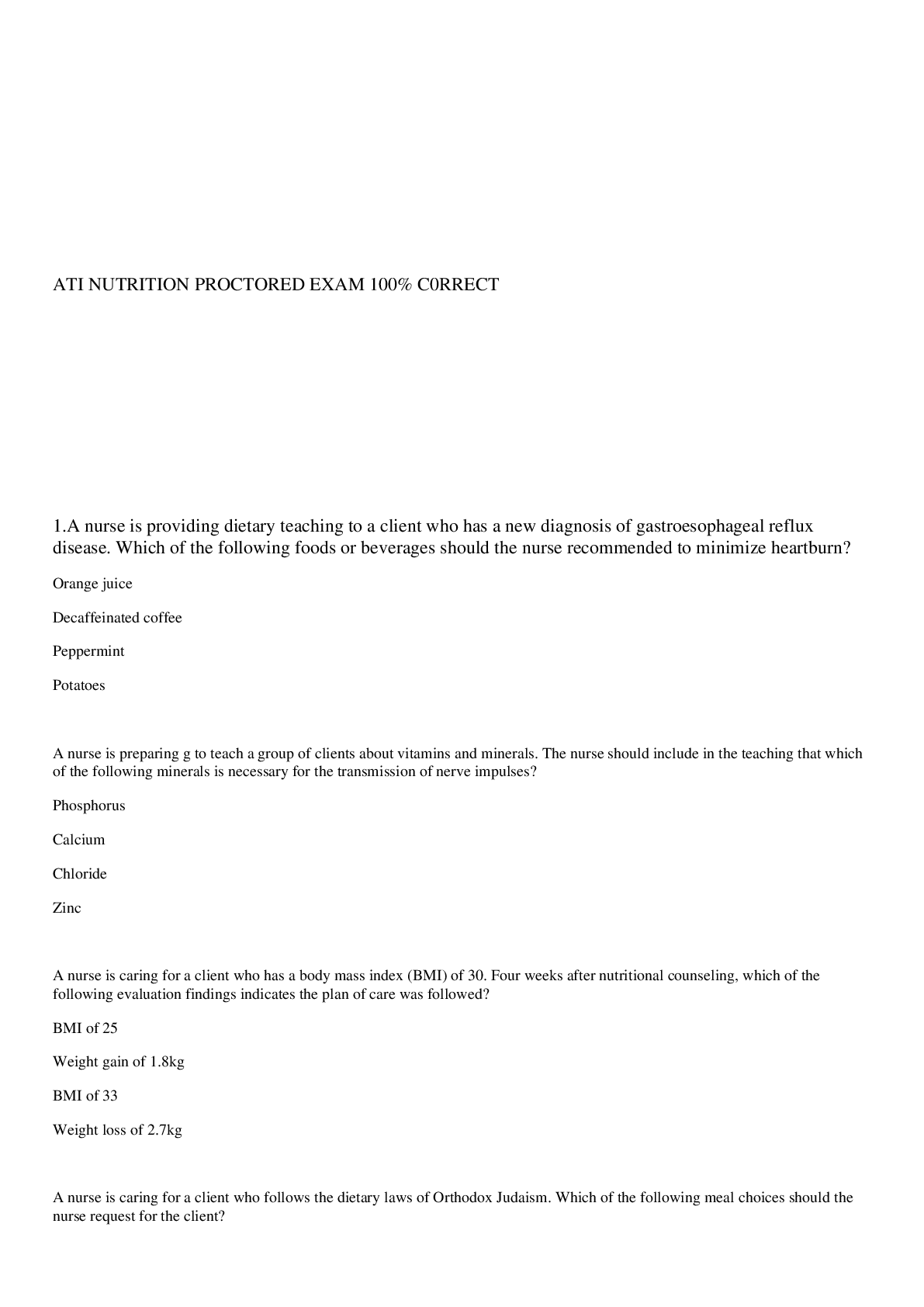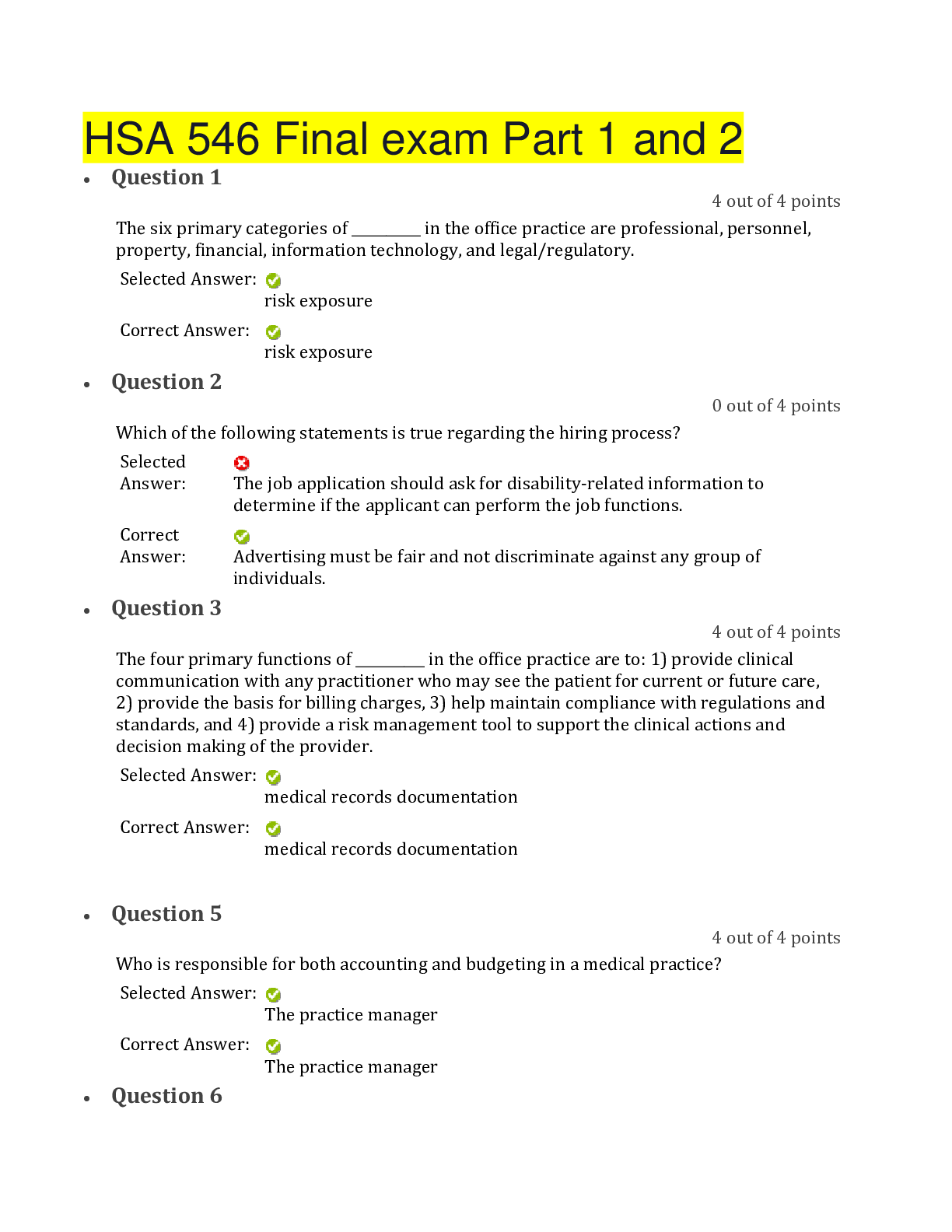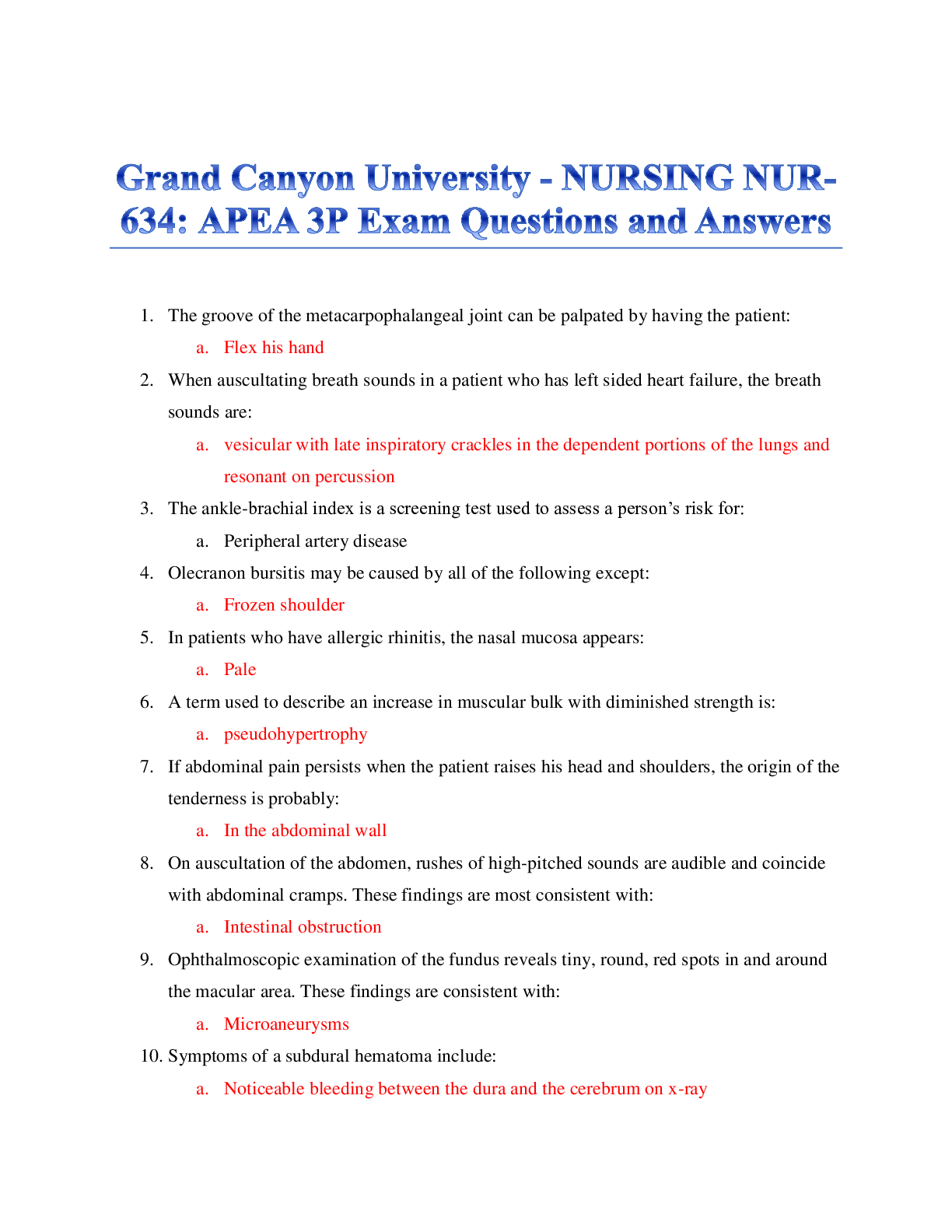TNCC Final Exam Test 2022 Open Book. 50 Questions And Answers
Document Content and Description Below
TNCC final exam test 2022 open book Why is a measure of serum lactate obtained in the initial assessment of the trauma patient? a) to measure oxygenation and ventilation b) to quantify the base de... ficit for the adequacy of cellular perfusion c) to gauge end-organ perfusion and tissue hypoxia d) to determine the underlying cause of shock A trauma patient is restless and repeatedly asking "where am I?" vital signs upon arrival were BP 100/60 mm Hg, HR 96 beats/min, and RR 24 breaths/min. Her skin is cool and dry. Current vital signs are BP 104/84mm Hg, HR 108, RR 28 breaths/min. The patient is demonstrating signs and symptoms of which stage of shock? A) compensated B) Progressive C) irreversible D) decompensated An elderly patient with a history of anticoagulant use presents after a fall at home that day. she denies any loss of consciousness. She has a hematoma to her forehead and complains of headache, dizziness, and nausea. Which is a most likely cause of her symptoms? A) epidural hematoma B) diffuse axonal injury C) post-concussive syndrome D) subdural hematoma EMS brings a patient who fell riding his bicycle. Using the American College of Surgeons screening guidelines, which assessment finding would prompt the nurse to prepare the patient for radiologic spine clearance? A) Alert with no neurologic deficits B) Multiple abrasions to the extremities C) Multiple requests of water D) Smell of alcohol on breath Which of the following occurs during the third impact of a motor vehicle crash? A) The driver of the vehicle collides with the steering wheel B) the vehicle collides with a tree C) the aorta is torn at its attachment with the ligamentum arteriosum D) the airbag deploys and strikes the front seat passenger A passenger is brought to the emergency department of a rural hospital following a high-speed MVC. When significant abdominal and pelvic injuries are noted in the primary survey, which of the following is the priority interventions? A) initiate transfer to a trauma center B) provide report to the operating room nurse C) Obtained imaging studies D) Place a gastric tube Which of the following injuries is LEAST likely to be promptly identified? A) spleen B) lung C) bowel D) brain Patients with a crush injury should be monitored for which of the following conditions? A) Hypernatremia B) Hypercalcemia C) Dysrhthmias D) polyuria What finding raises suspicion of complete spinal cord injury? A) Weakness in the lower extremities B) Priapism C) voluntary anal sphincter tone D) intact reflexes distal to the injury A patient with a complete spinal cord injury in neurogenic shock will demonstrate hypotension and which other clinical signs? A) Bradycardia and ipsilateral absences of motor function B) Tachycardia and respiratory depression C) Tachycardia and absent motor function below the level of injury D) Bradycardia and absent motor function below the level of the injury A 5-year old child presents to the ED with bruises to the upper arms and buttocks in various stages of healing and multiple small, clean, round burns to the back. There are no abnormalities found based on the pediatric assessment triangle or primary survey. Which of the following is the priority nursing intervention? A) report your suspicion of the maltreatment in accordance with local regulations B) apply ice to the bruises and consult wound care C) engage in therapeutic communication to determine the MOI D) provide the family with injury prevention resourse A patient with lower extremity fracture complains of severe pain and tightness in his calf, minimally relieved by pain medications. Which of the following is the priority nursing intervention? A) elevating the extremity above the level of the heart B) repositioning and apply ice C) Elevating the extremity to the level of the heart D) Preparing the patient for ultrasound A 36-year old female has a deformity of the left wrist after a fall. She is reluctant to move her hand due to pain. Which of the following is the most appropriate intervention? A) apply a sling and elevate the extremity to the level of the heart. B) apply a splint and ELEVATE ABOVE THE LEVEL OF THE HEART C) Apply a sling and elevate the extremity above the level of the heart D) apply a splint and elevate the extremity to the level of the heart. Which of the following is a late sign of increased intracranial pressure? Cushing Response Widening pulse pressure Reflex bradycardia Decreased RR - A) Restlessness or drowsiness B) Nausea and vomiting C) Decreased respiratory effort D) amnesia and anxiety Which of the following mnemonics can help the nurse prioritize care for a trauma patient with massive uncontrolled hemorrhage? A) ABC B) MARCH C) AVPU D) VIPP A patient is thrown against a car during a tornado and presents with obvious bilateral femoral fractures. The patient is pale, alert, disoriented, and has delayed cap refill. Which of the following interventions would be most appropriate for this patient based on the disaster triage principle? A) initiate two large caliber intravenous lines for Ringers lactate solution administration B) Administer Dilaudid for pain control and provide comfort care C) Place the patient in an observation area for care within the next few hours D) Contact the command center for the personnel to notify next of kin. A patient arrives with a large open chest wound after being assault ed with a machete, Prehospital providers placed a nonporous dressing over the chest wound and tapes it on 3 sides. He is now showing signs of anxiety, restlessness, severe respiratory distress, cyanosis, and decreasing blood pressure. Which of the following is the MOST appropriate interventions? A) needle decompression B) tube thoracostomy C) dressing removal D) surgical repair A patient is found lying on the floor after falling 13 hours ago. Which of the following lab values is expected with a musculoskeletal complication associated with this presentation? A) elevated creatine kinase B) decreased potassium level C) decreased WBC D) elevated GFR A 56-year- male patient involved in a MVC is brought to the ED of a rural critical access facility. He c/o neck pain, SOB, and diffuse abd pain. His GCS is 15. His vitals are as follows: BP 98/71 HR 125 beats/min RR 26 breaths/min SpO2 94% on high flow O2 via NRB mask which of the following is the priority intervention for this patient? A) Expedite transport to the CT scanner B) prepare the patient for spinal radiographs C) expedite transfer to the closest trauma center D) notify the patients family Caregivers carry a 2-year old into the ED who fell out of 2nd story window. The patient is awake and crying with increased work of breathing and pale skin. which of the following interventions has the highest priority? A) padding the upper back while stabilizing the cervical spine B) applying a tight-fitting NRB mask with an attached resevior C) establishing intravenous access and administering a 20mL/kg bolus D) preparing for drug assisted intubation Which of the following is a component of the trauma triad of death? hypothermia, metabolic acidosis, coagulopathy - A) Acidosis B) hyperthermia C) hemorrhage D) sepsis A 35-year old male presents with facial trauma after bring struck inthe face with a baseball. a tear-drop shaped left pupil is noted on exam. What type of injury is suspected? A) oculomotor nerve palsy B) globe rupture C) uncal herniation D) retinal detachment Which of the following is true about the log roll maneuver? A) it causes less spinal motion than the lift and slide manuever B) it is recommended for patients with unstable pelvic fractures C) it can worsen cord damage from an unstable spinal injury D) it does not increases the risk of life threatening hemorrhage from unstable injuries EMS arrives with the intoxicated driver of a car involved in a MVC. EMS reports significant damage to the drivers side of the car. The patient is asking to have the cervical color removed. when is it appropriate to remove the cervical collar? A) after a physical examination if the patient has no radiologic abnormalities on a computed tomography scan B) after physician evaluation if the patient has not neurologic abnormalities on exam C) after palpation of the spine if the patient has no point tenderness the the vertebral column D) after physical examination if the patient has not neck pain with movement Tearing of the bridging veins is most frequently associated with which brain injury? A) epidural hematoma B) subdural hematoma C) diffuse axonal injury D) intracerebral hematoma If a patient has received multiple transfusions of banked blood preserved with citrate, which electrolyte is most likely to drop and require supplementation? A) potassium B) magnesium C) sodium D) calcium A trauma patient is en route to a rural ED. Radiology notifies the charge nurse that the CT scanner will be out of service for several of hours. The team gathers to plan accordingly. Which of the following terms best describes this trauma teams communication? A) Brief B) loop C) debrief D) huddle The nurse is caring for a 120 kg male is brought in after a warehouse fire and is calculating the patient's fluid resuscitation needs. He has painful red blistering to the entire surface of both upper extremities and superficial burns to the anterior chest. Using the modified Lund and Browder chart to calculate the total BSA burned, how much IV fluids would be administered in the first 8 hours? (upper arm 4+4 / lower arm 3+3 / hand 2.5+2.5) = 19% TBSA. 120 kg x (2 mL) x (19% TBSA) = 4560 mL 4560 / 2 (half of fluids given in first 8 hours) = 2280 mL A) 2280 mL B) 3840 mL C) 4560 mL D) 7680 mL Which of the following assessment findings differentiates a tension PTX from a simple PTX? Assessment findings associated with tension pneumothorax include anxiety, severe restlessness, severe respiratory distress, and absent breath sounds on the injured side. Hypotension due to compression of the heart and great vessels is consistent with obstructive shock. Hypotension worsens with inspiration due to increased intrathoracic pressure. Late signs include distended neck veins, tracheal deviation, and cyanosis. - A) increased work of breathing B) unilaterally diminished breath sounds C) pleuritic chest pain D) hypotension that worsens with inspiration Which of the following considerations is most important when caring for a geriatric trauma patient? A) head to to exam B) medical history C) incontinence D) falls An intubated trauma patient is being transferred to a tertiary care center. After moving the patient to the stretcher for transport, a drop in pulse oximetry to 85% is noted. Which of the following is the priority interventions? A) call for a portable CXR stat B) chest to make sure the ventilator is plugged in C) suction the ET tube D) confirm ET tube placement What factor contributes most the kinetic energy of a body in motion? A) acceleration B) mass C) velocity D) inertia During the primary survey of an unconscious patient with multi-system trauma, the nurse notes snoring respirations. Which priority nursing interventions should be performed next? A) open the airway with the head-tilt/chin lift maneuver B) auscultate bilateral breath sounds to assess ventilatory status C) assist respirations using a BVM D) insert an oropharyngeal airway if there is no gag reflex Following a review of recent drills and a real disaster event, a hospital has identified deficiencies and is taking steps to minimize the impact of future disaster. Which phase of the disaster life cycle does this describe? A) mitigation B) preparedness C) response D) recovery Which pulse pressure description is an indication of early hypovolemic shock? A) widened B) narrowed C) bounding D) weak The most reassuring finding for a male patient with hop pain after a fall is which of the following? A) a normal prostate exam B) absence of abdominal distension C) a normal fast exam D) pelvic stability A 49-year old restrained driver involved in a MVC presents to the trauma center c/o abd, pelvic, and bil lower extremity pain Vitals signs are stable. The nurse can anticipate all of these negative fast exam except which of the following? The FAST exam is done at the bedside to identify pathological fluid in the abdominal and pelvic cavities. FAST exams reduce the use of more invasive diagnostic peritoneal lavage and can be repeated if clinical changes or hemodynamic changes occur. A negative FAST study does not rule out injury and may warrant a follow-up computed tomography scan. Serial FAST exams can identify increasing abdominal fluid collections from hemorrhage. Diagnostic peritoneal lavage/diagnostic peritoneal aspiration is performed by the surgical team to rapidly identify the presence of hemorrhage in patients who are hemodynamically unstable after trauma. - A) diagnostic peritoneal lavage B) serial fast exams C) abdominal and pelvic CT scans D) serial abdominal assessments Which of the following is an expected finding in a patient with a thoracostomy connected to a chest drainage system? A) output of 200 mL/hr B) tubing clamp closed for transport C) dependent loops in the tubing to promote drainage D) fluctuations in the water serial chamber Which of the following patients warrants referral to a burn center? A) a 21- year old female with a partial thickness burn to the right forearm B) a 40-year old hypertensive male with a superficial burn to the back C) a 52-year old diabetic male with partial thickness burn to the left lower leg D) a 35-year old hyperlipidemic female with superficial burns to the anterior thorax. A patient has been in the ED for several hours waiting to be admitted. He sustained multiple rib fractures and a femur fracture after a fall. He has been awake, alert, and c/o leg pain. His wife reported suddenly becoming anxious and confused. Upon reassessment, the patient is restless, with respiratory distress and petechiae to his neck. the patient is exhibiting signs of symptoms commonly associated with which of the following conditions? A) acute lung injury B) fat embolism C) PTX D) pulmonary contusion Which is the effect of hypothermia on the oxyhemoglobin dissociation curve? A) Hemoglobin does not readily release oxygen for use by the tissues B) The amount of oxygen available to the tissues increases C) Tissue oxygenation (PaO2) increases D) Hemoglobin molecule saturation (SaO2) decreases A 20-year old male presents to the ED c/o severe lower abd pain after landing hard on the bicycle cross bars which performing an aerial BMX maneuver. Secondary assessment reveals lower abd tenderness and scrotal ecchymosis. Which of the following orders would the nurse questions? A) Fast exam B) CT scan C) straight cath for urine sample D) ice and elevation of the scrotum You are treating a 27-year old male in respiratory distress who was involved in a house fire. Calculating TBSA burned is deferred d/t the need for emergent intubation. At what rate should you begin fluid resuscitation? A) 1000 mL/hr B) 500 mL/hr C) 250 mL/hr D) 125 mL/hr Which of the following is possible complication of positive-pressure ventilation? A) worsening pneumothorax B) worsening flail chest C) reabsorption of pleural air D) negative intrapleural pressure Which of the following is NOT considered goal-directed therapy of cardiogenic shock? A) controlled fluid boluses B) antidysrhythmic administration C) pericardiocentesis D) cardiac cath What bedside monitoring parameters are used to assess for adequacy of oxygenation and effectiveness of ventilation? A) pulse oximetry and capnogaphy B) respiratory rate and capnography C) pulse oximetry and respiratory rate D) capnography and capnometry Which if the following values indicates the need for alcohol withdrawal interventions? A) CIWA-Ar of 36 B) GCS 13 C) ETCo2 of 48 mm Hg D) heart rate of 45 beats/min An unresponsive trauma patient has an oropharyngeal airway in place, shallow and labored respiratory, and dusky skin. the trauma team has administered medications for drug assisted intubation and attempted intubation but was unsuccessful. What is the most appropriate immediate next step? A) Ventilate with a BVM B) Prepare for cricothyroidotomy C) administer reversal medications D) contact anesthesia for assistance The trauma nurse knows that placing a bariatric patients in a "ramped position" provides better visualization during the insertion of which device? A) Intraosseous line B) orogastric tube C) ET tube D) urinary catheter You are caring for a patient who was involved in a MVA and is 32 weeks pregnant. Findings of your secondary survey include abd pain on palpation, fundal high at the costal margin, and some dark bloody show. Varying, accelerations and decelerations are noted on the cardiotocography. These findings are most consistent with which of the following? A) placental abruption B) preterm labor C) uterine rupture D) fetal demise [Show More]
Last updated: 2 weeks ago
Preview 1 out of 11 pages
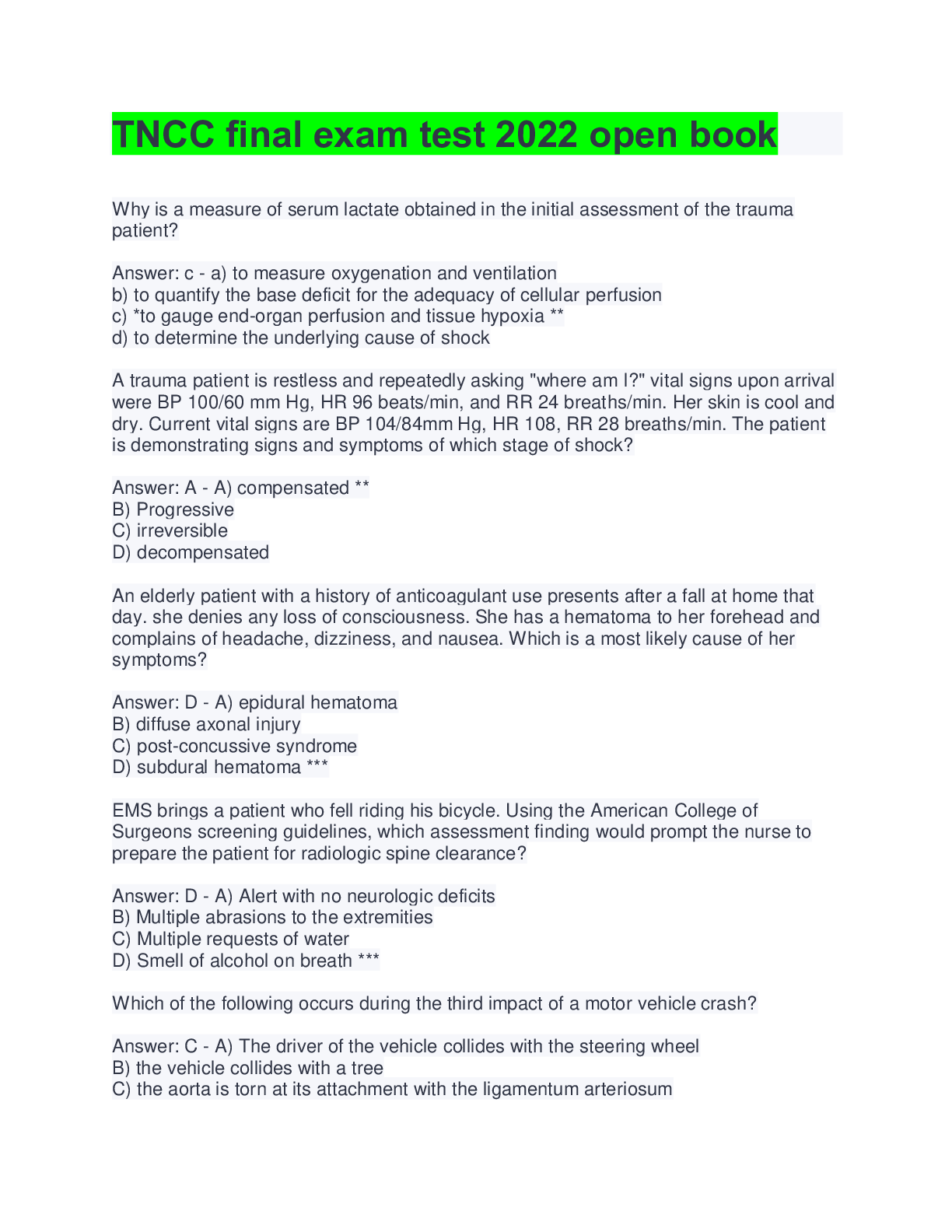
Document information
Connected school, study & course
About the document
Uploaded On
May 04, 2022
Number of pages
11
Written in
Additional information
This document has been written for:
Uploaded
May 04, 2022
Downloads
8
Views
820


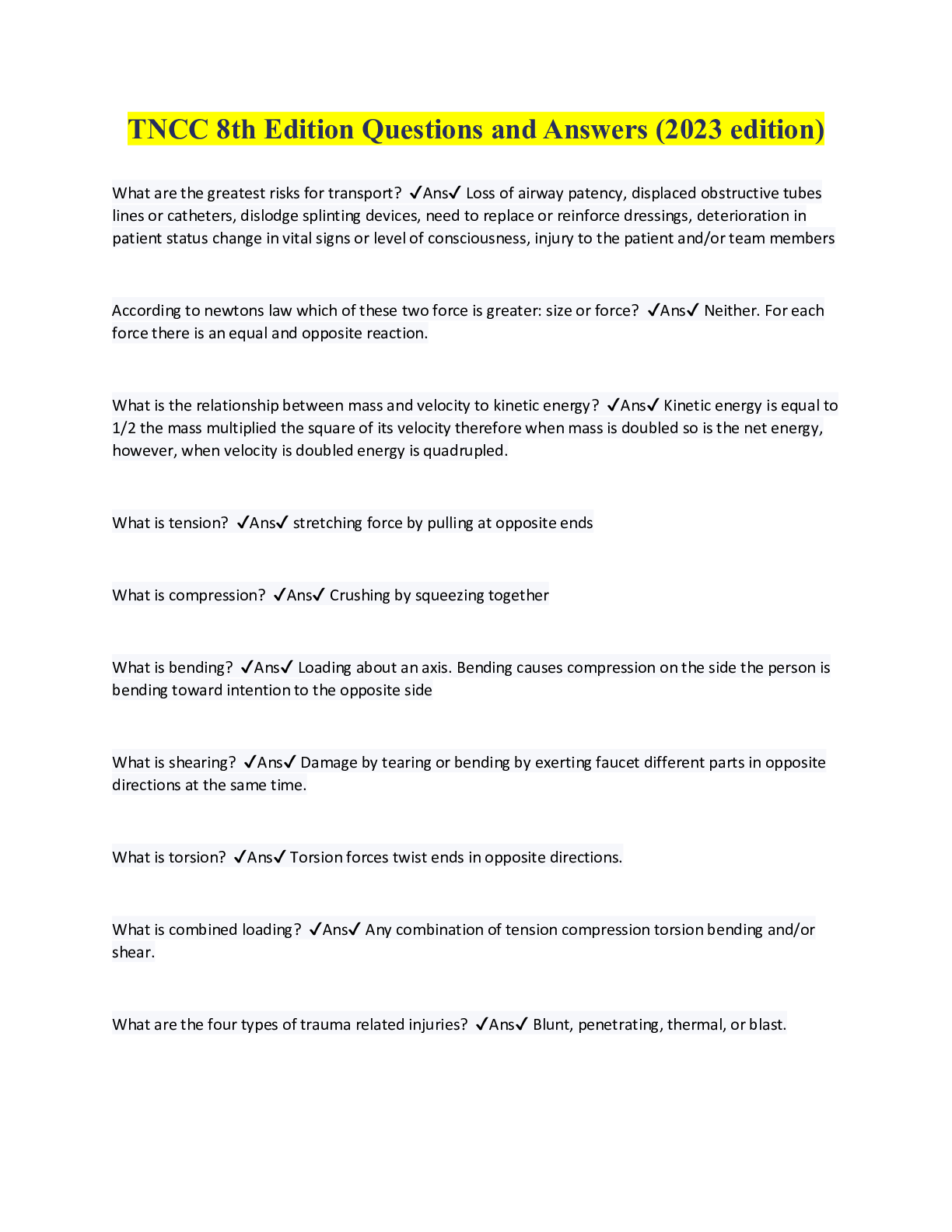
.png)
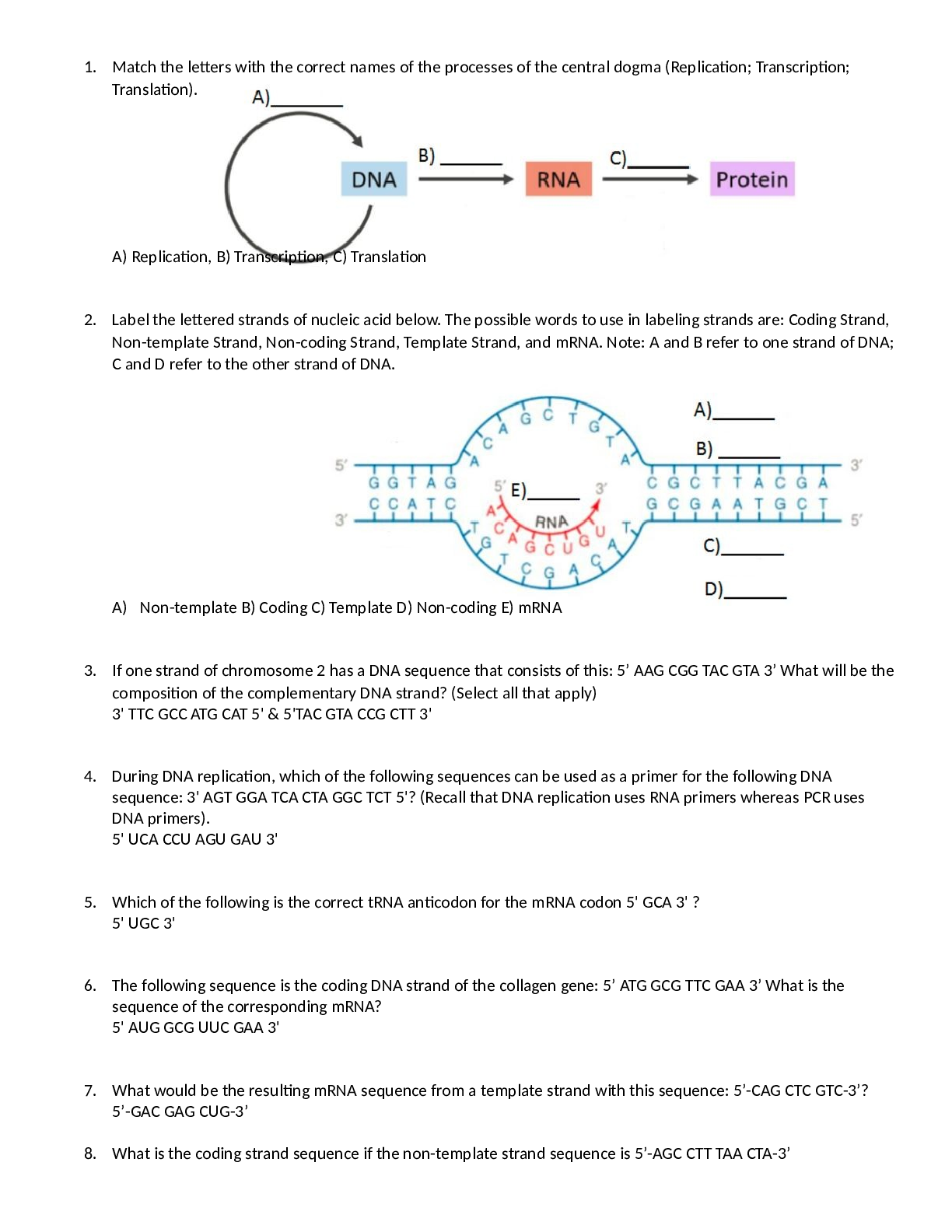

.png)

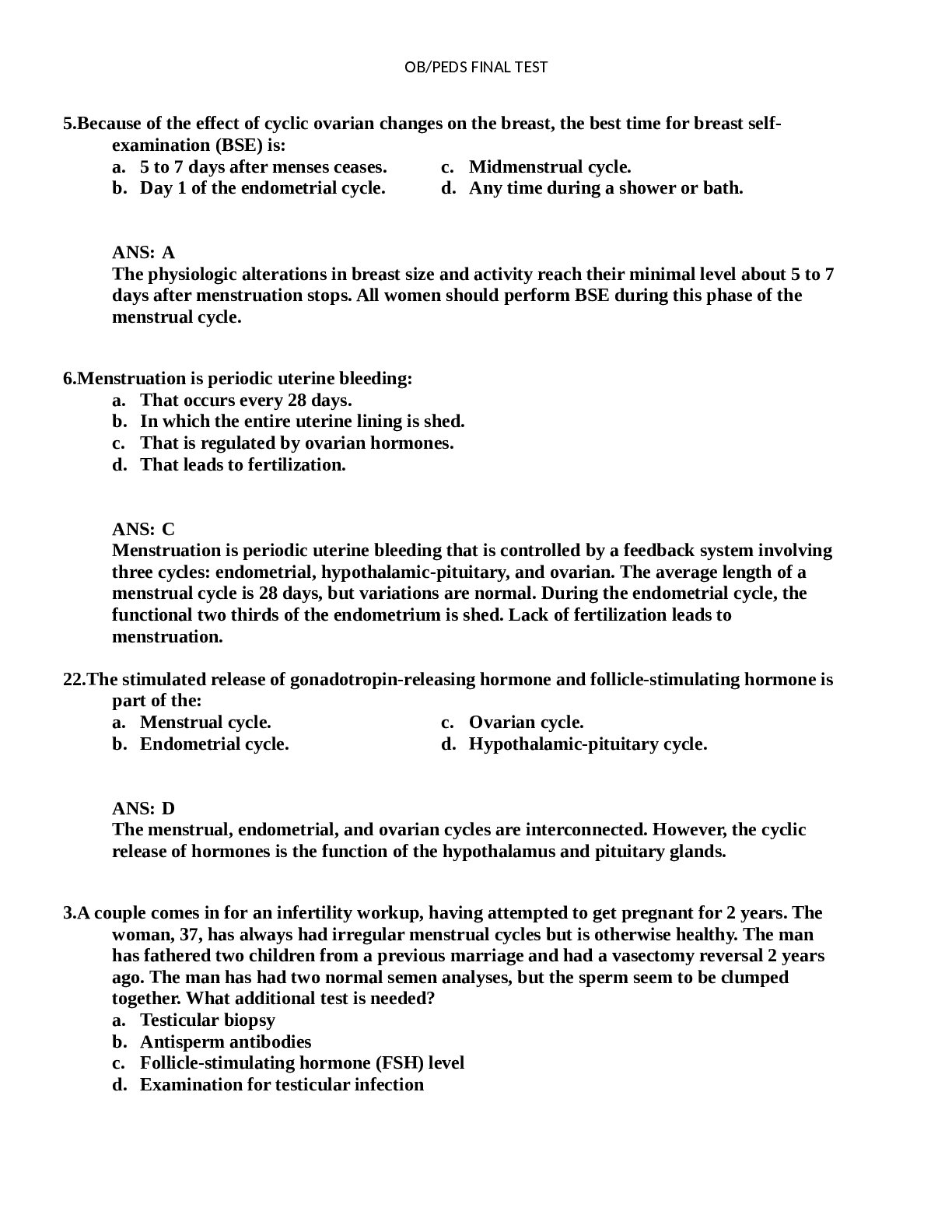
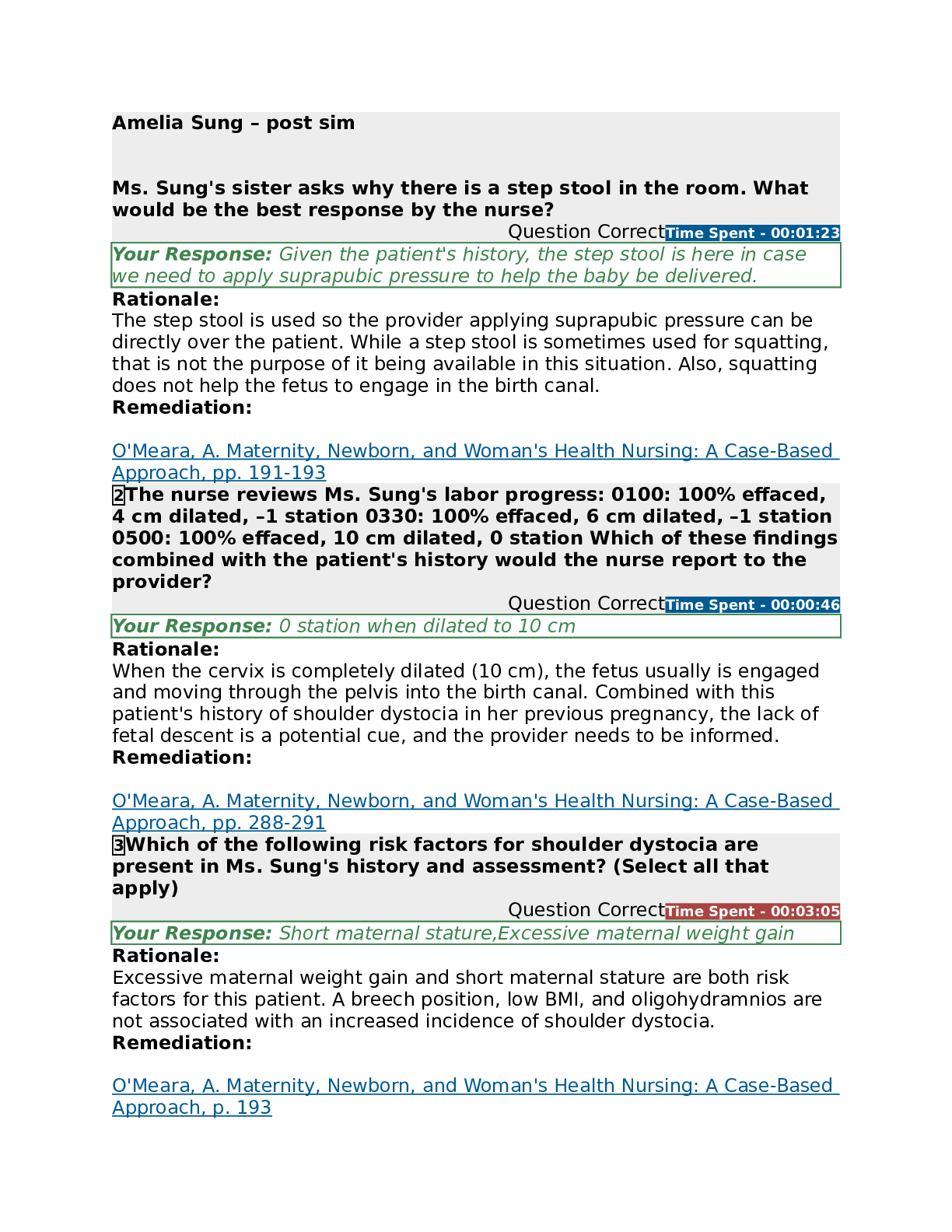
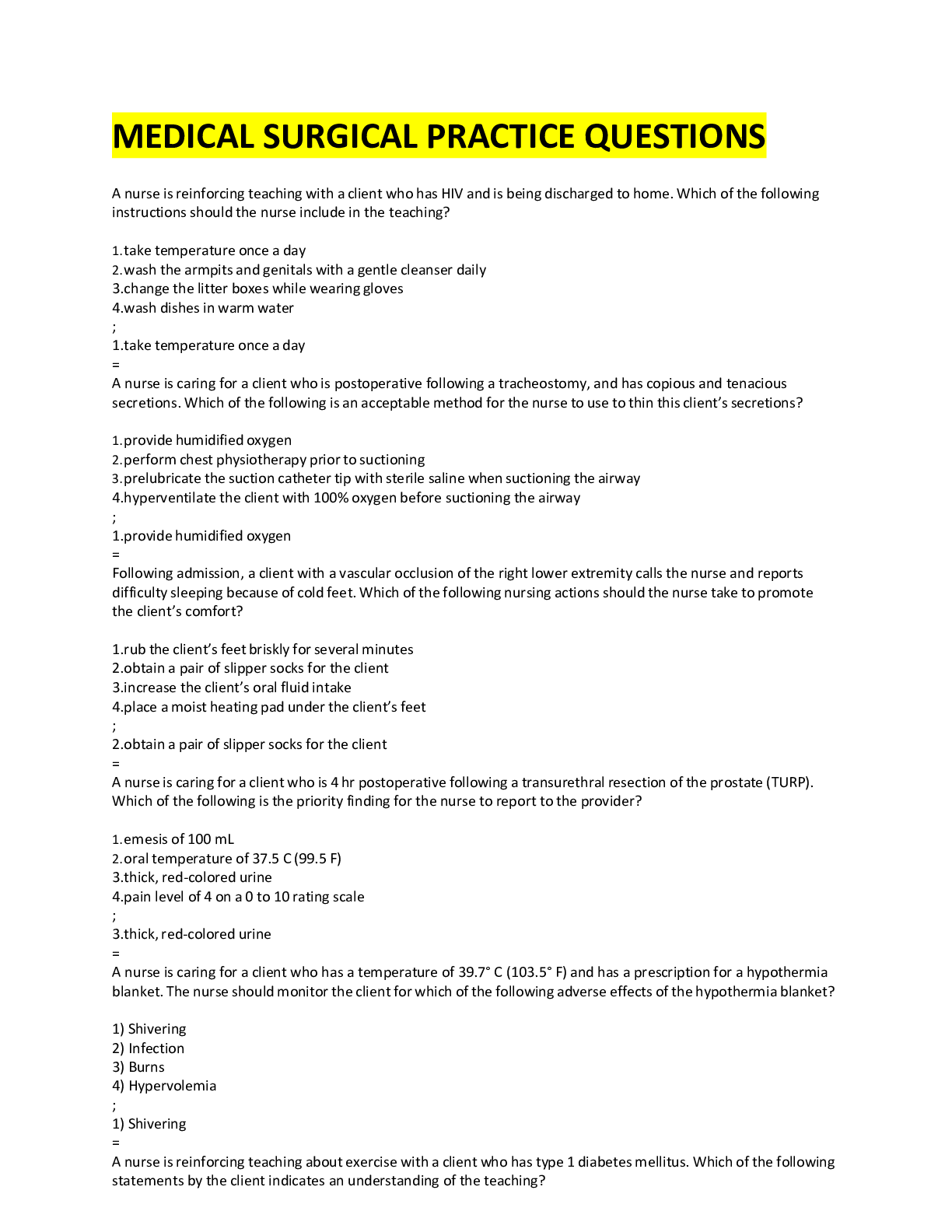

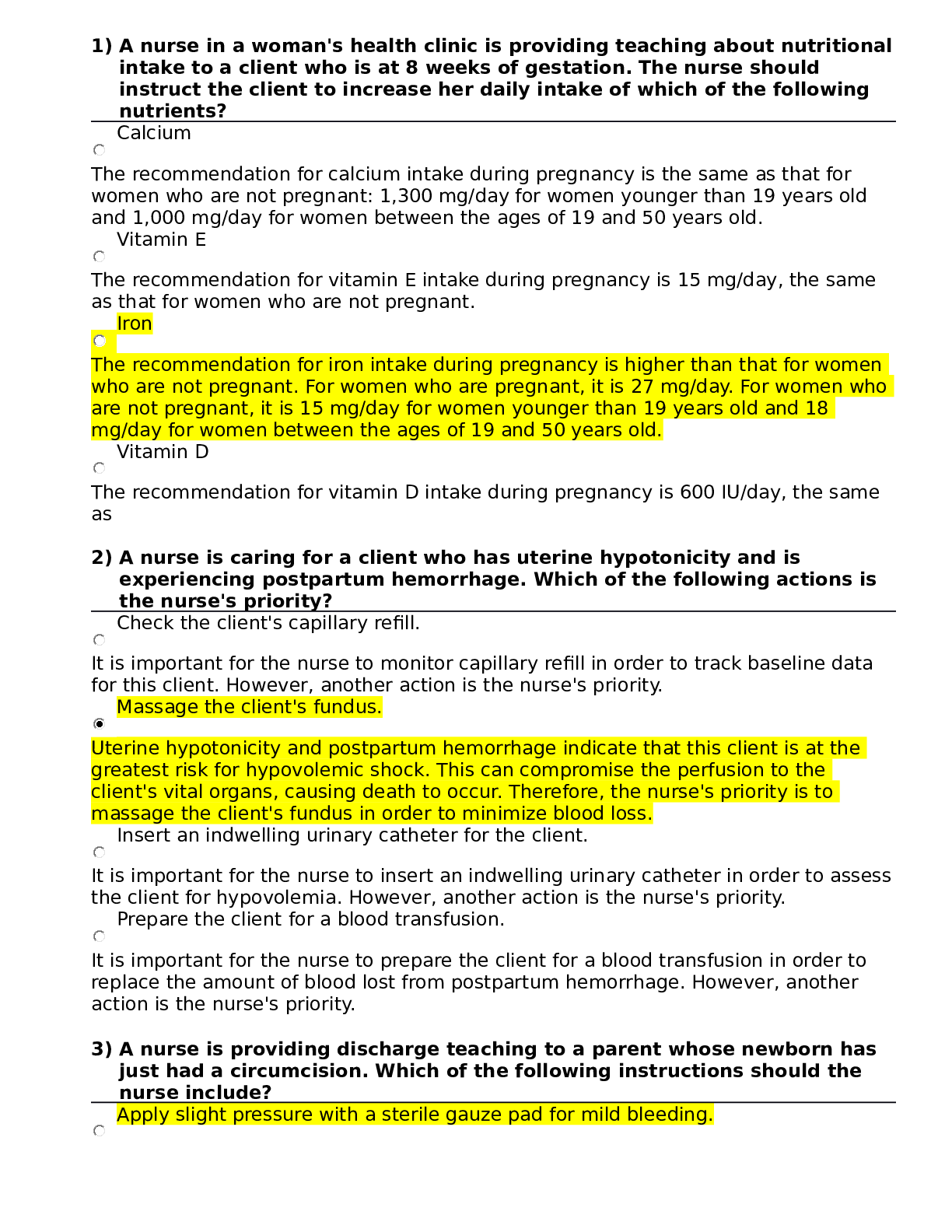
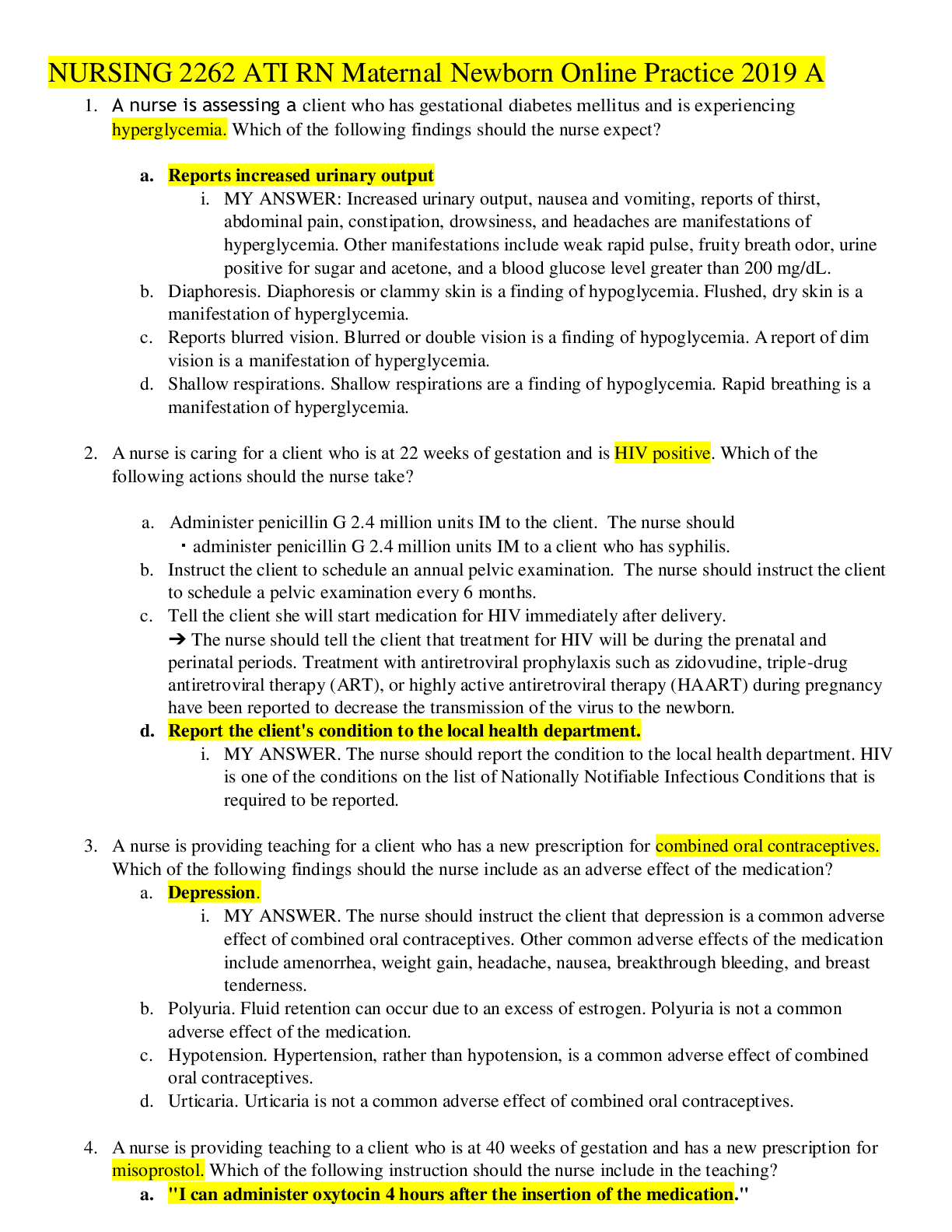
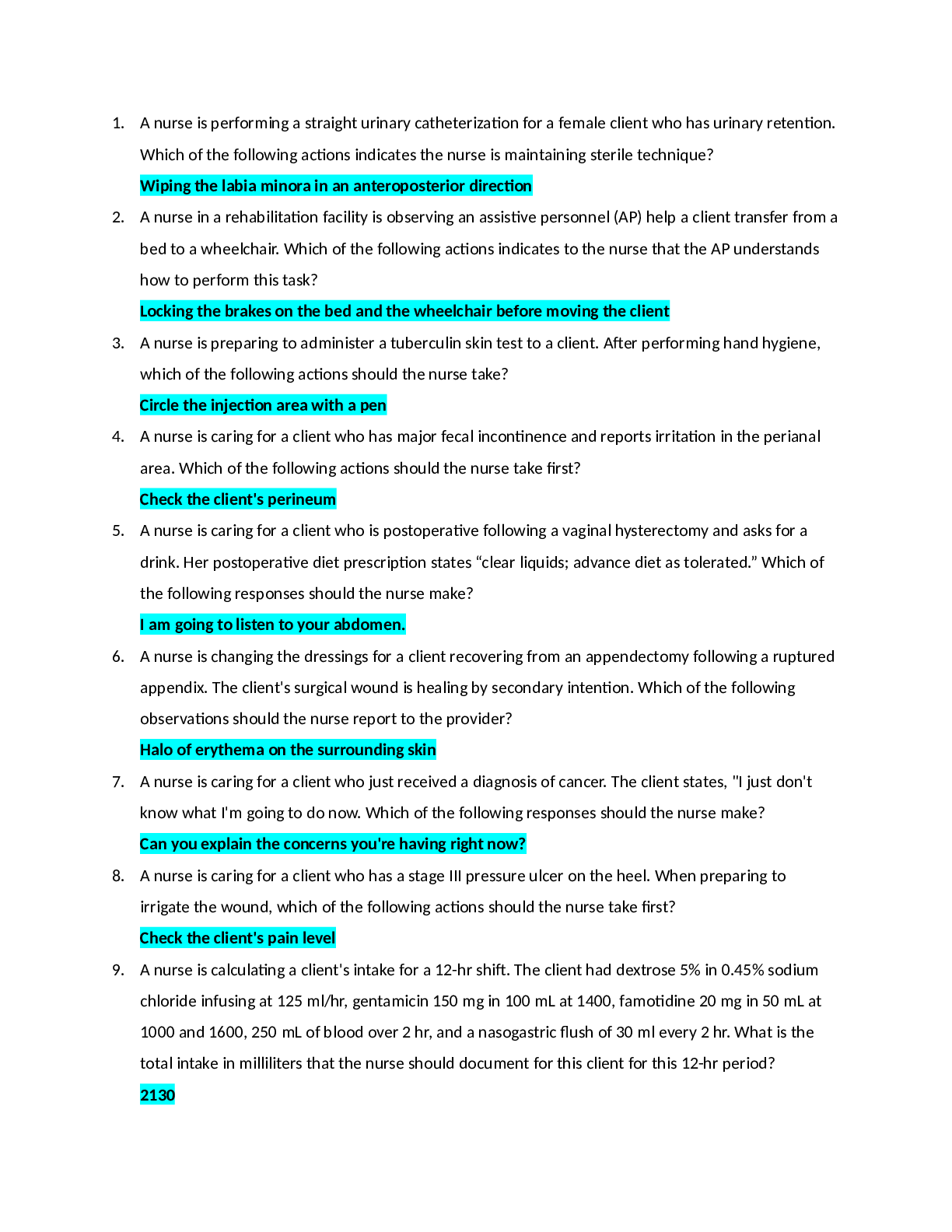
.png)

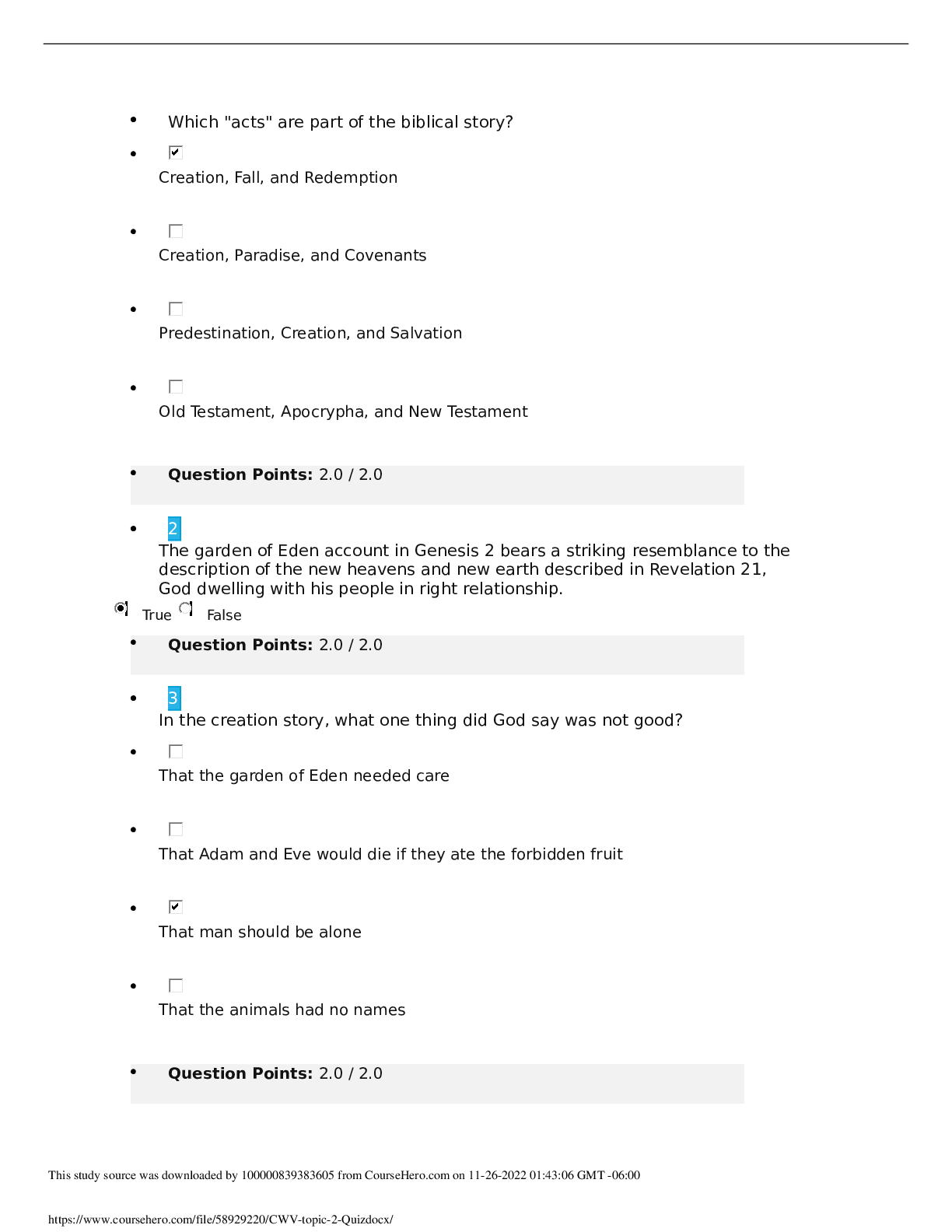
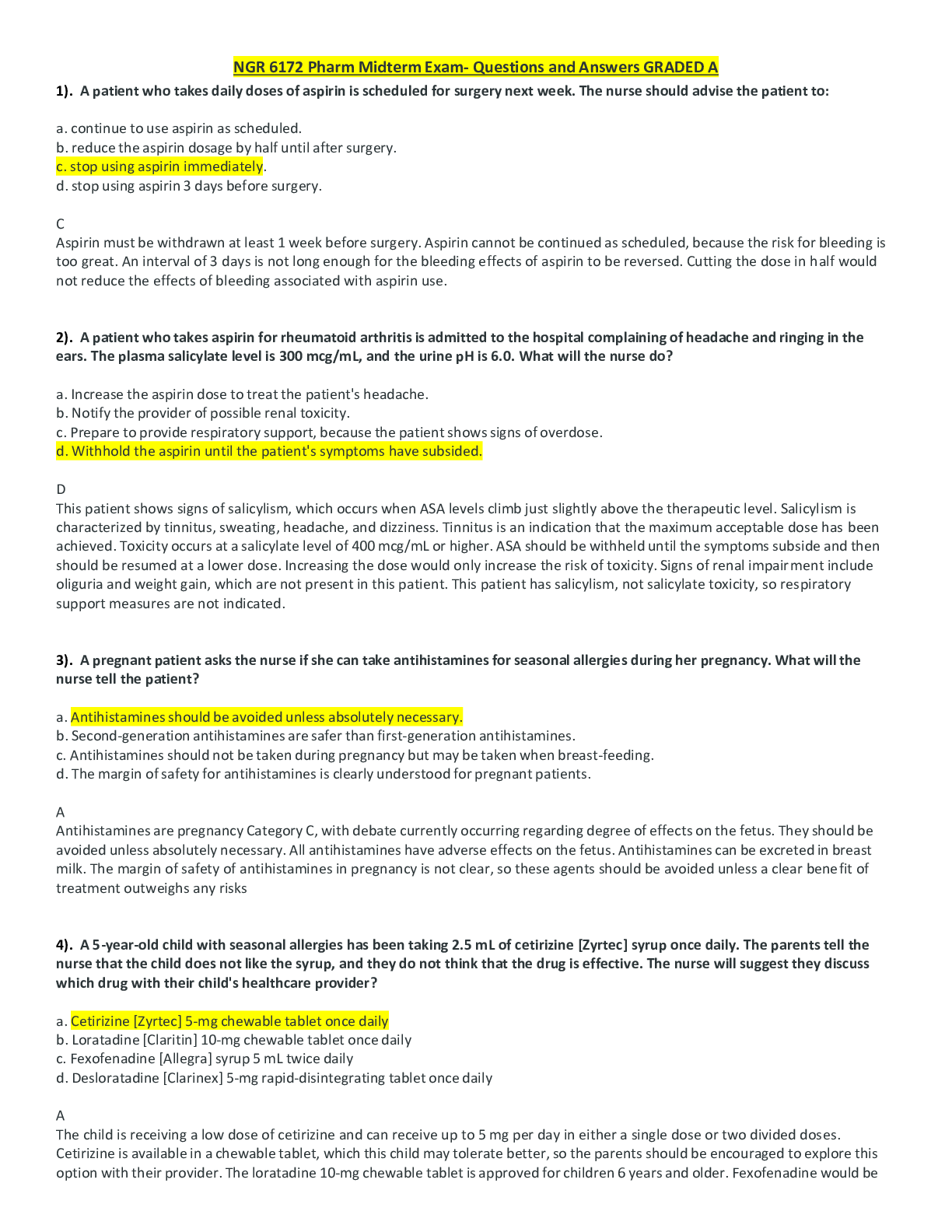
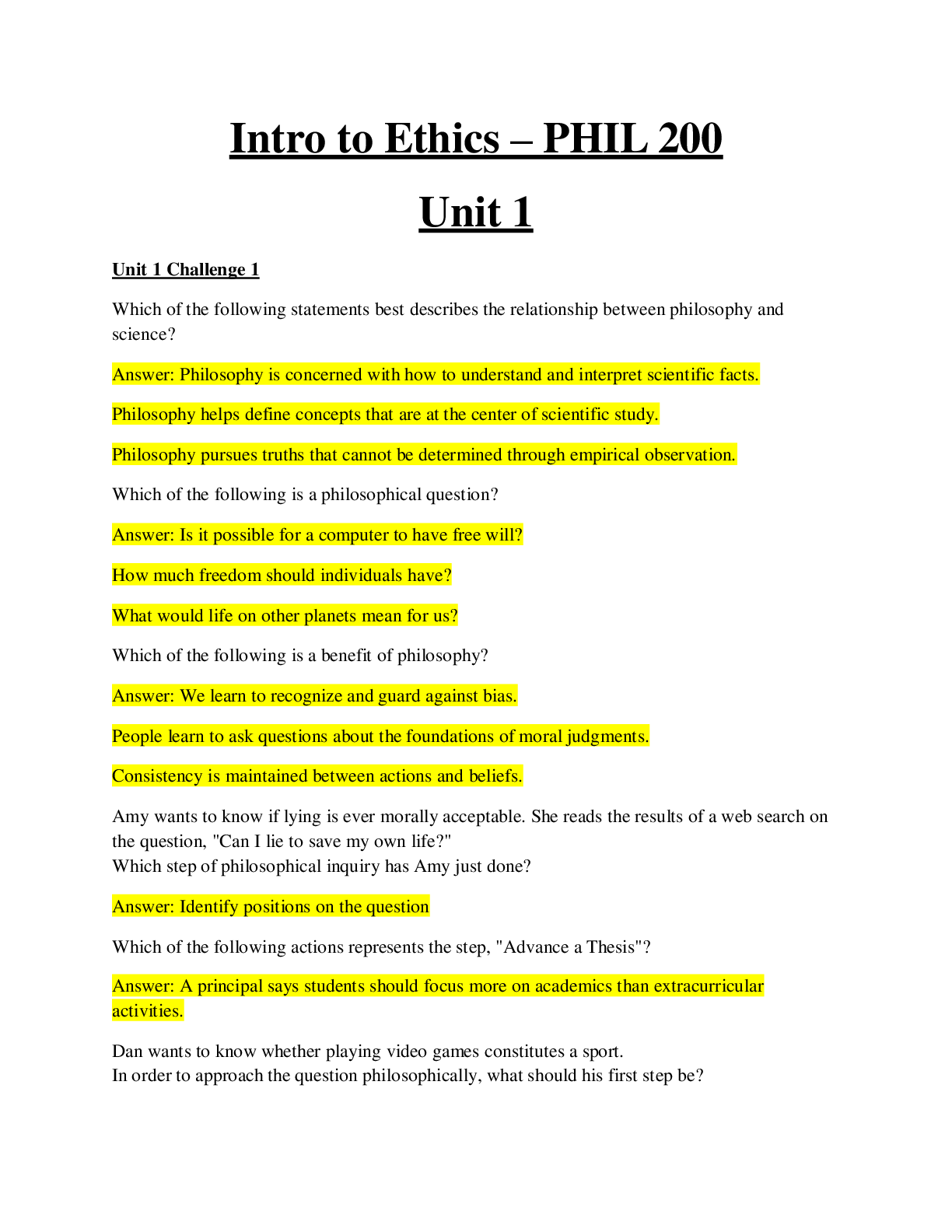

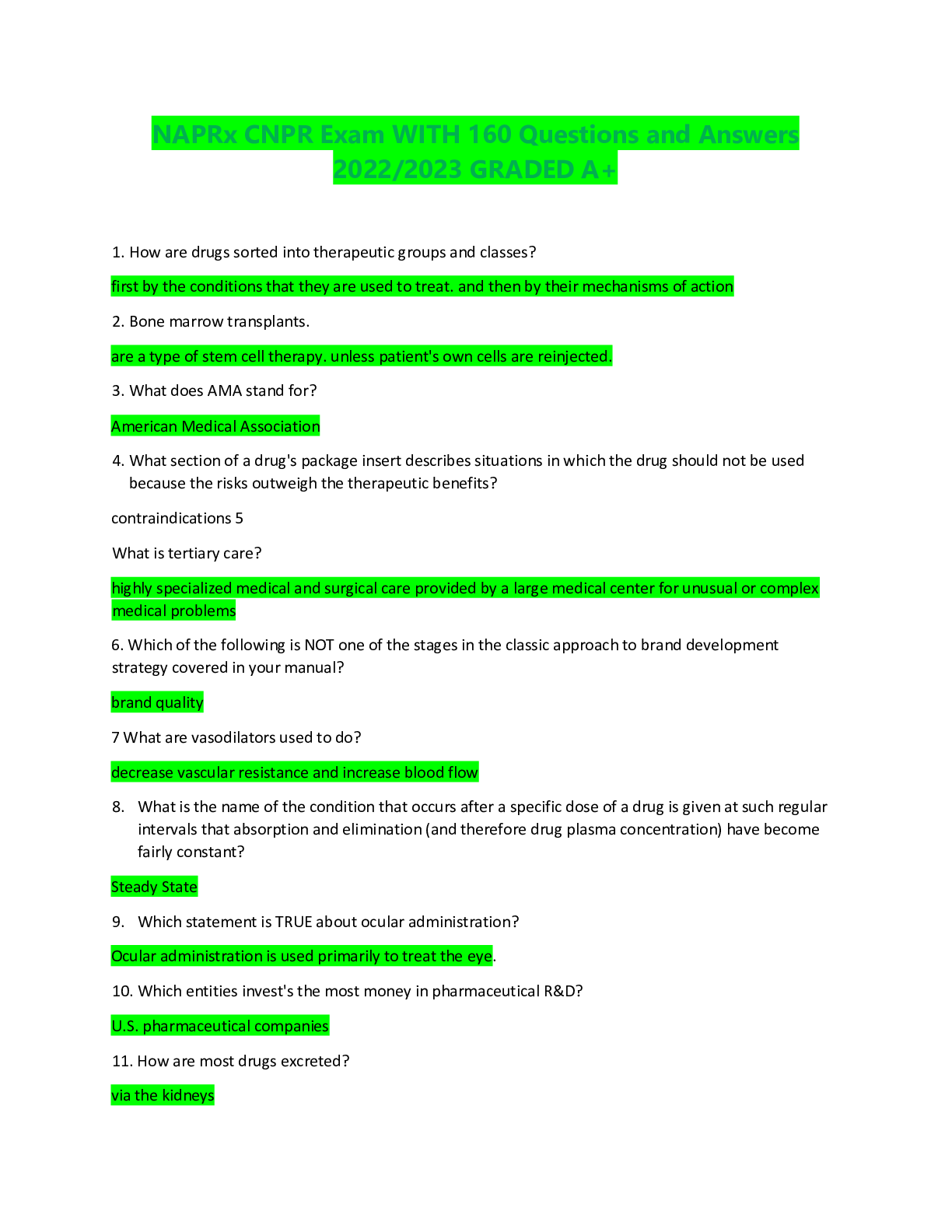
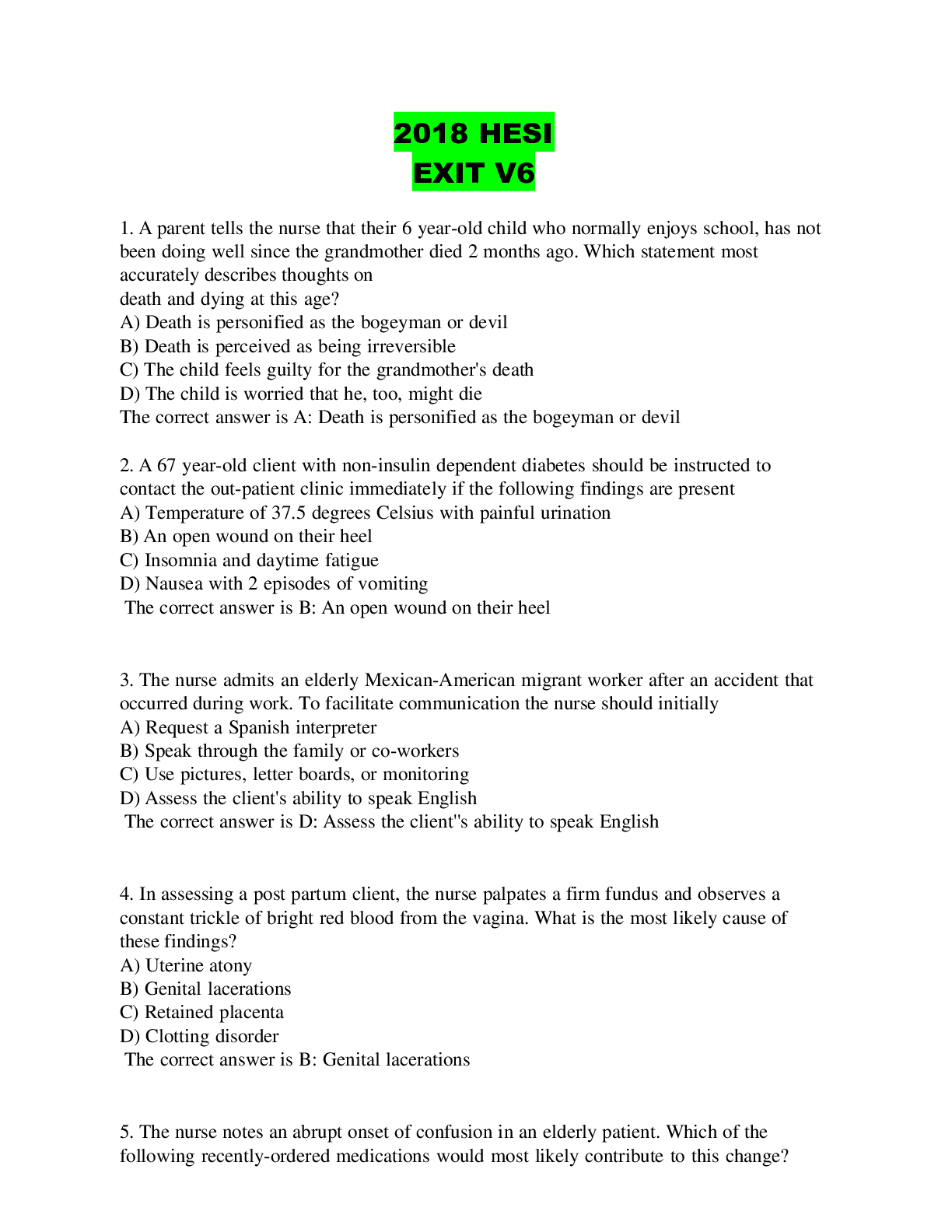
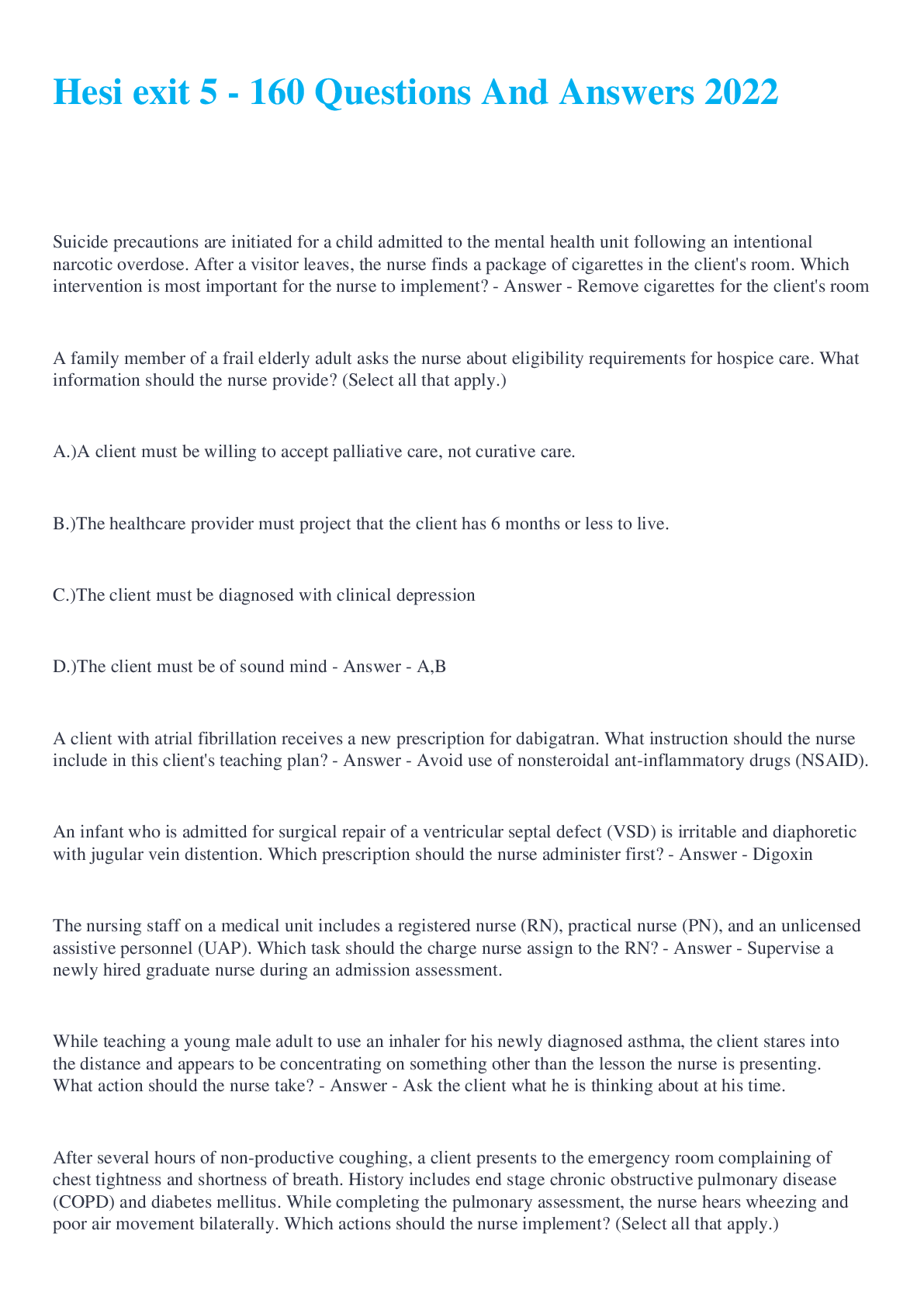
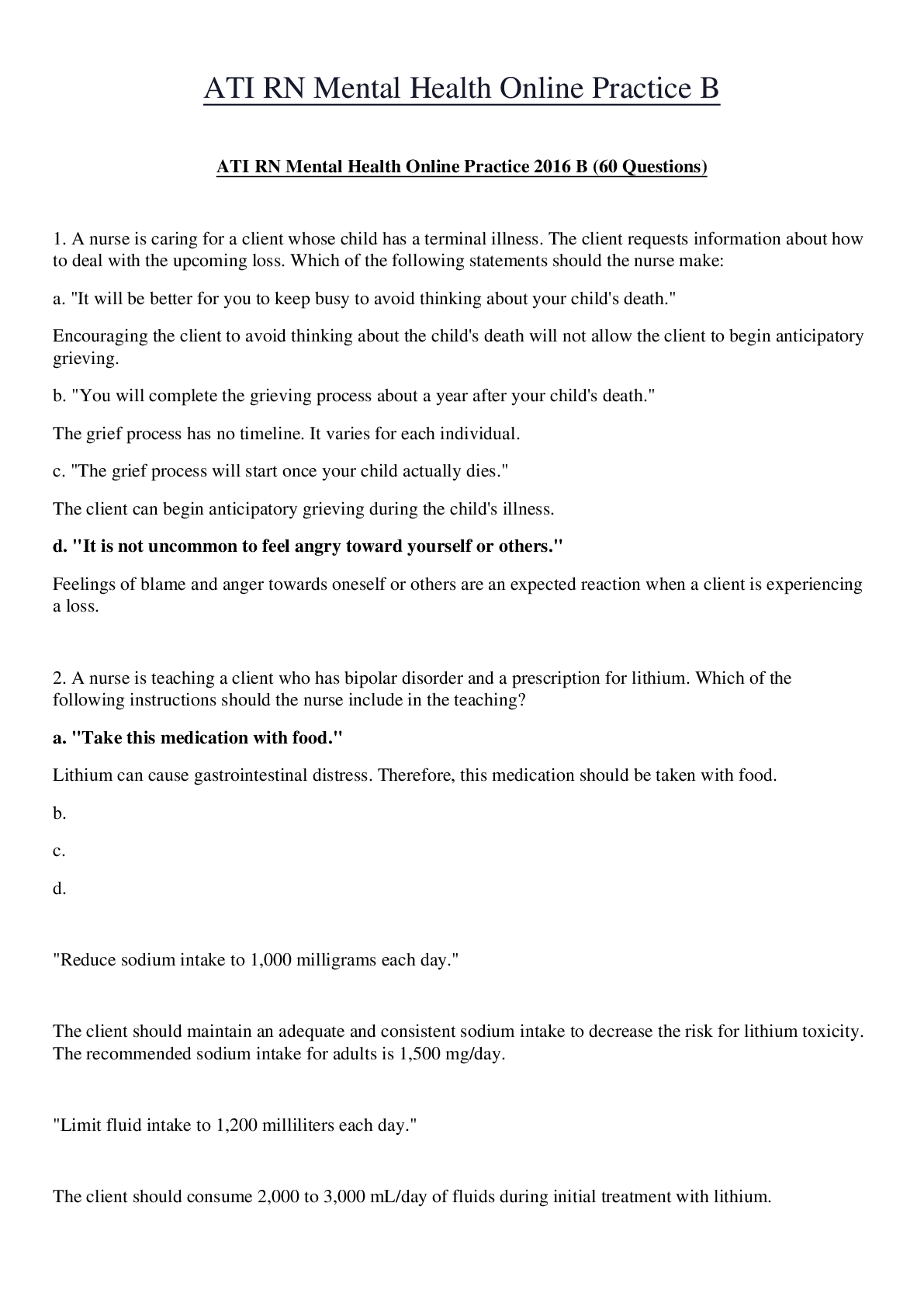
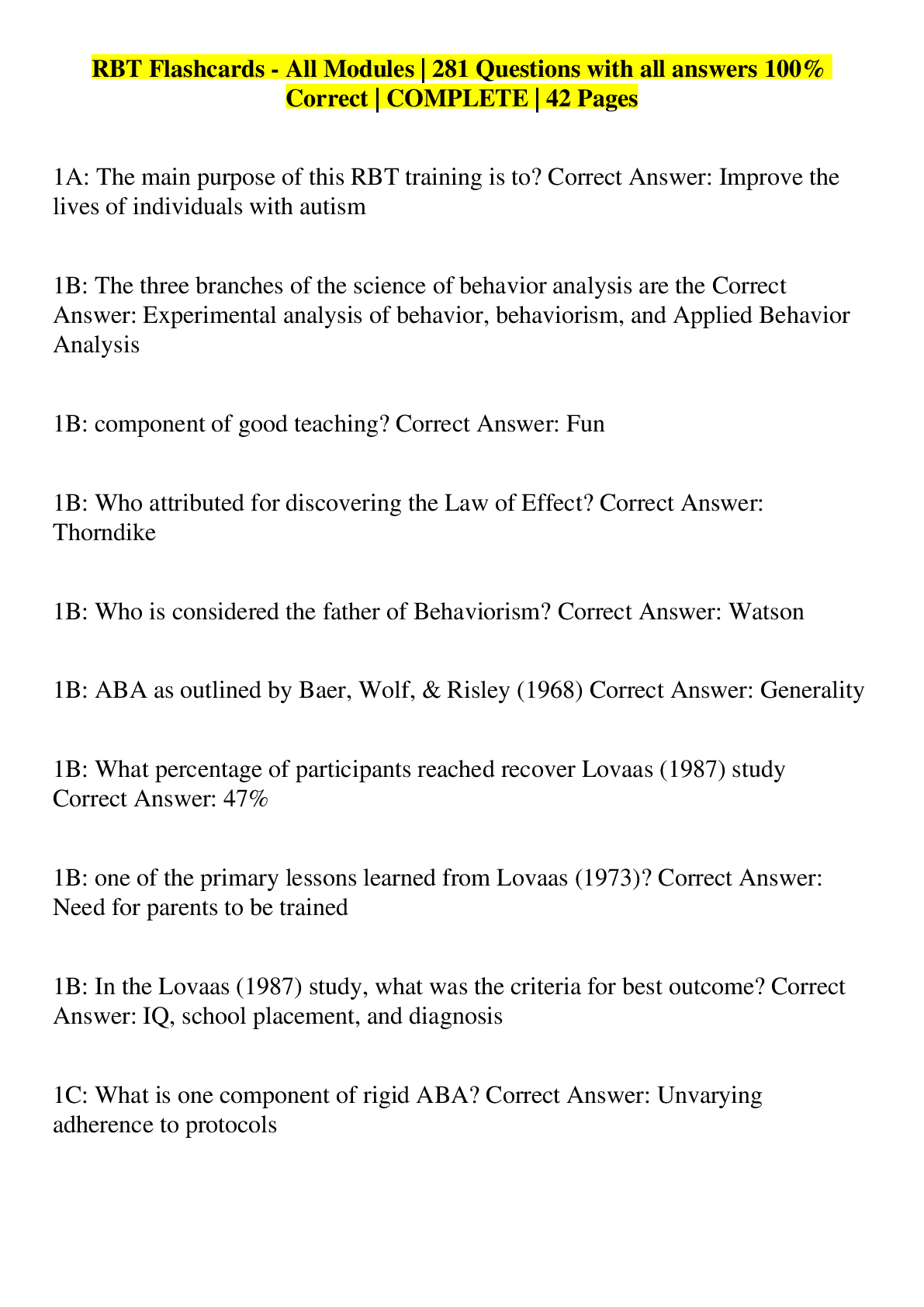
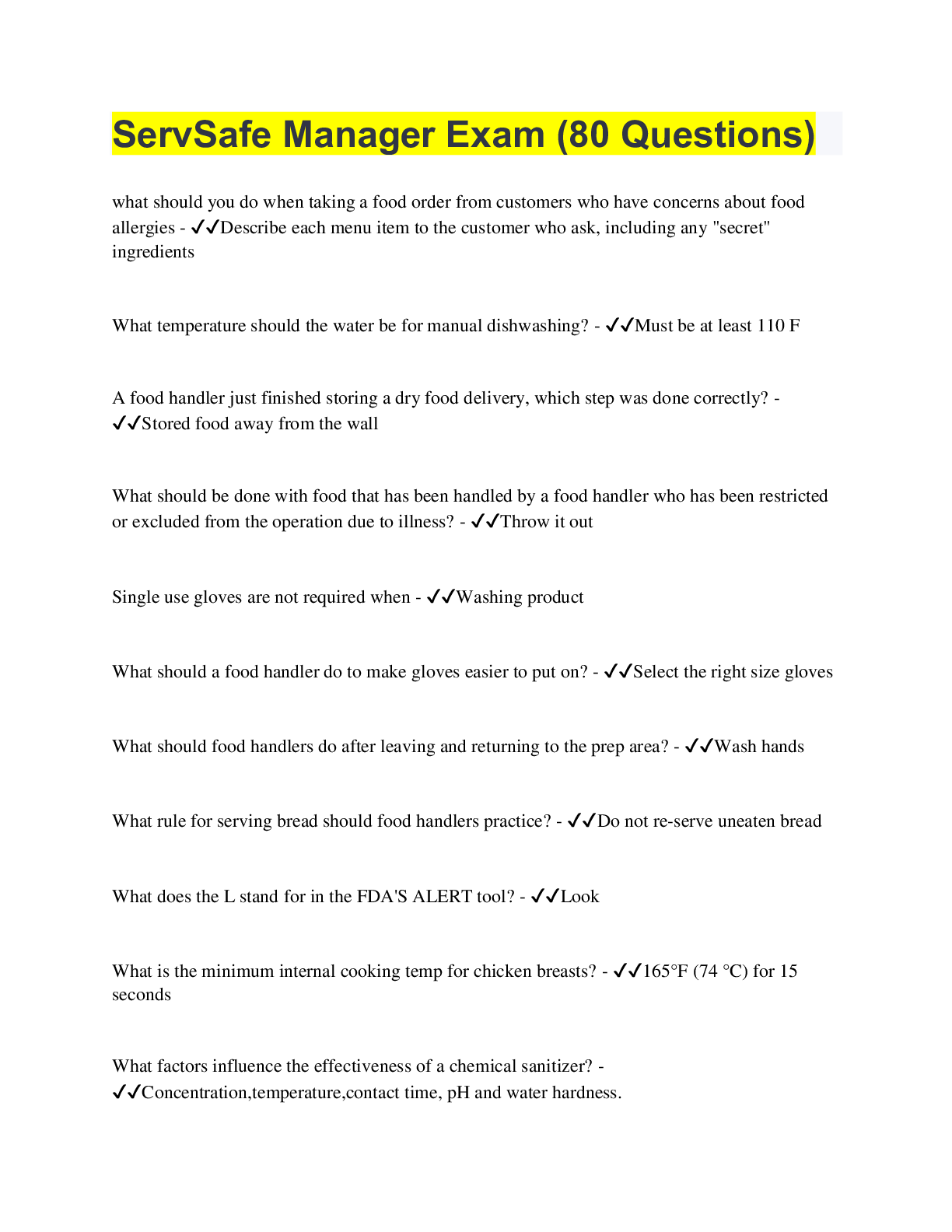
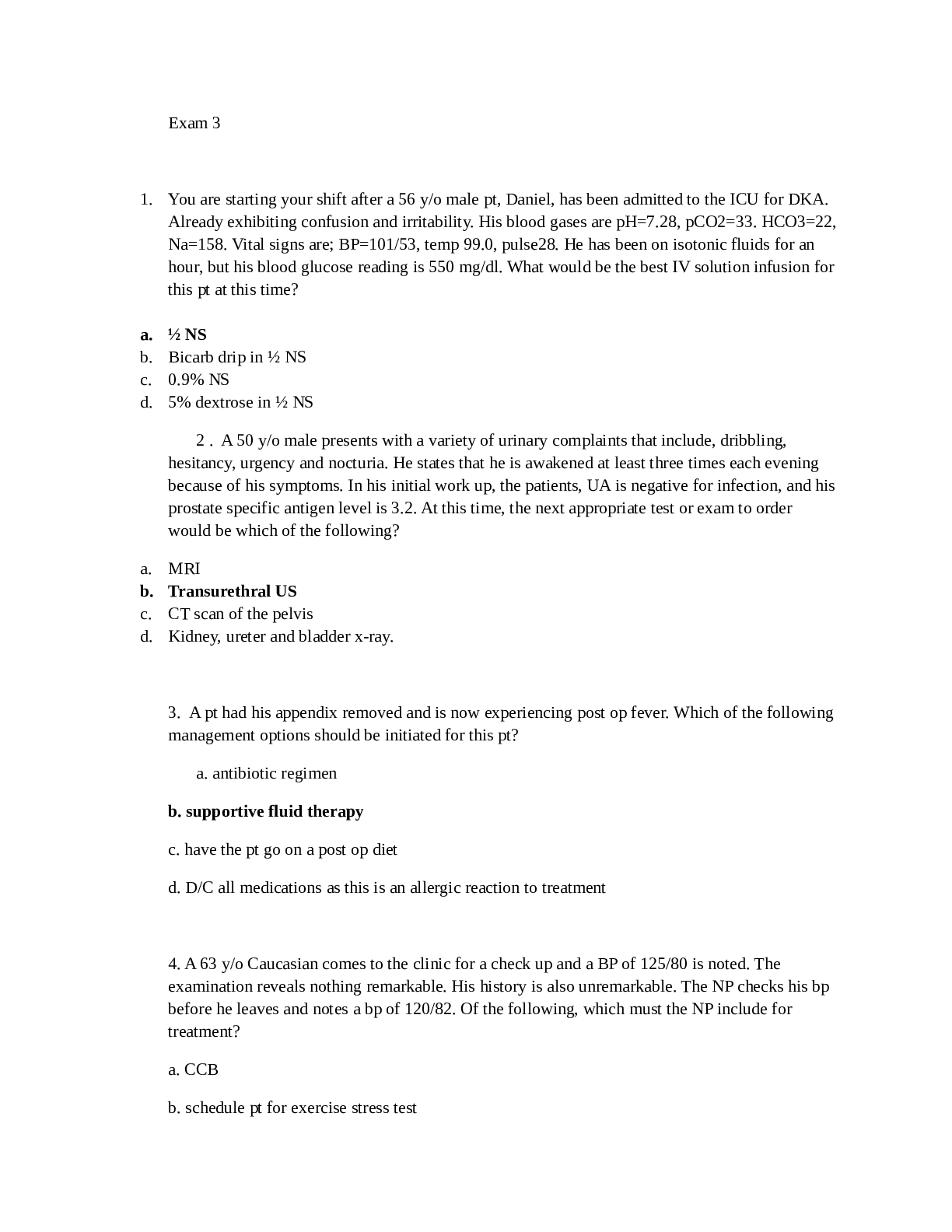
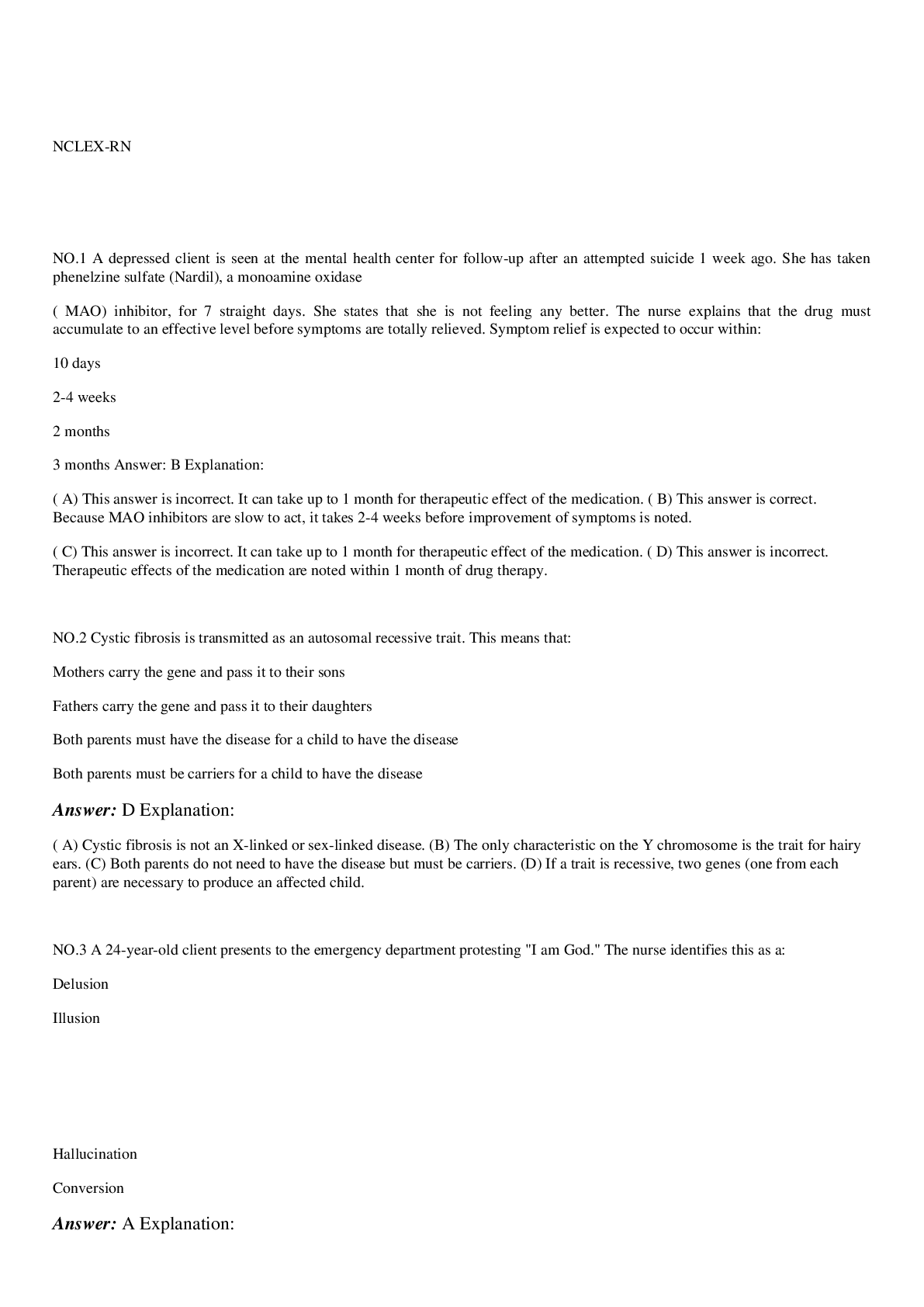
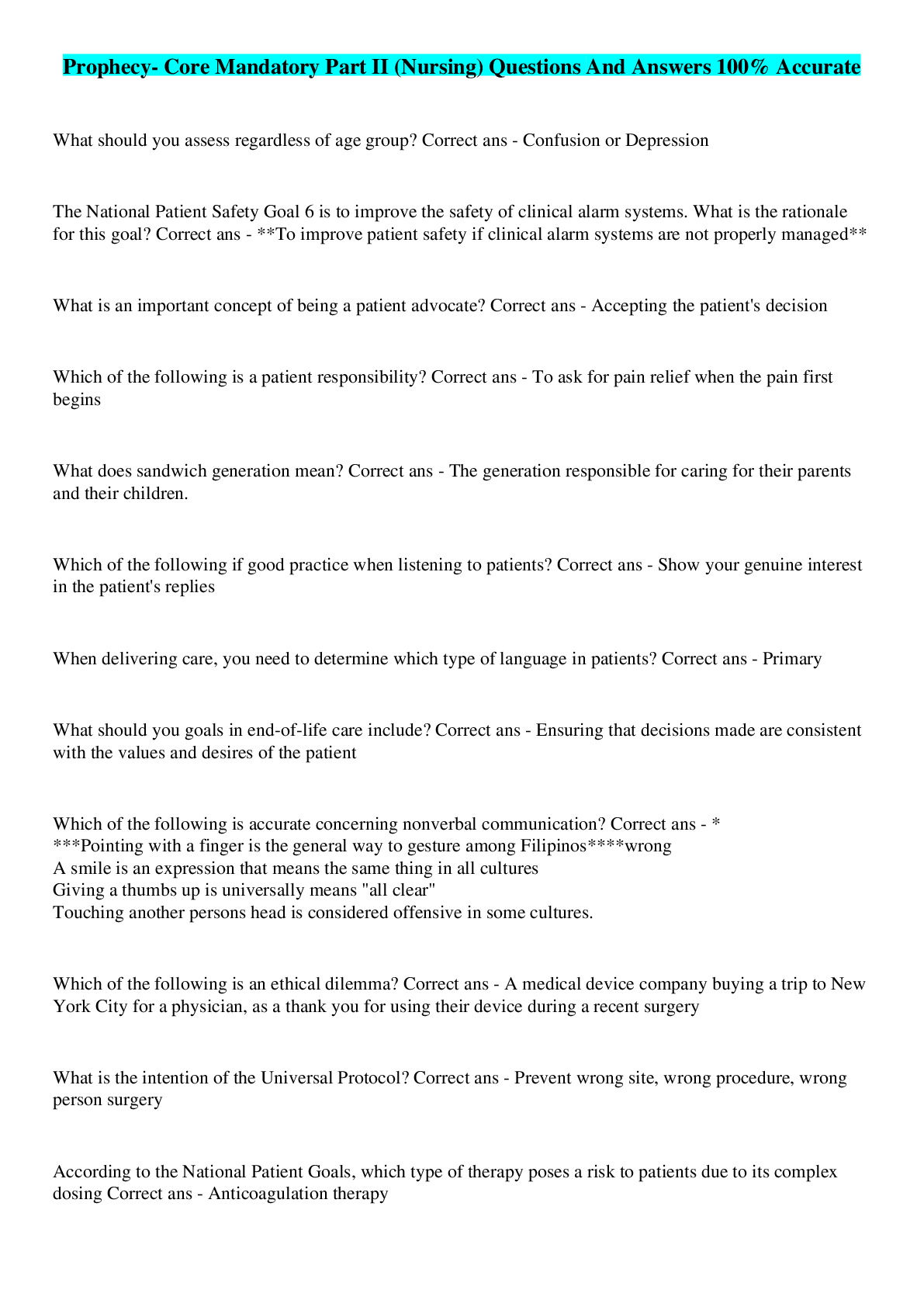

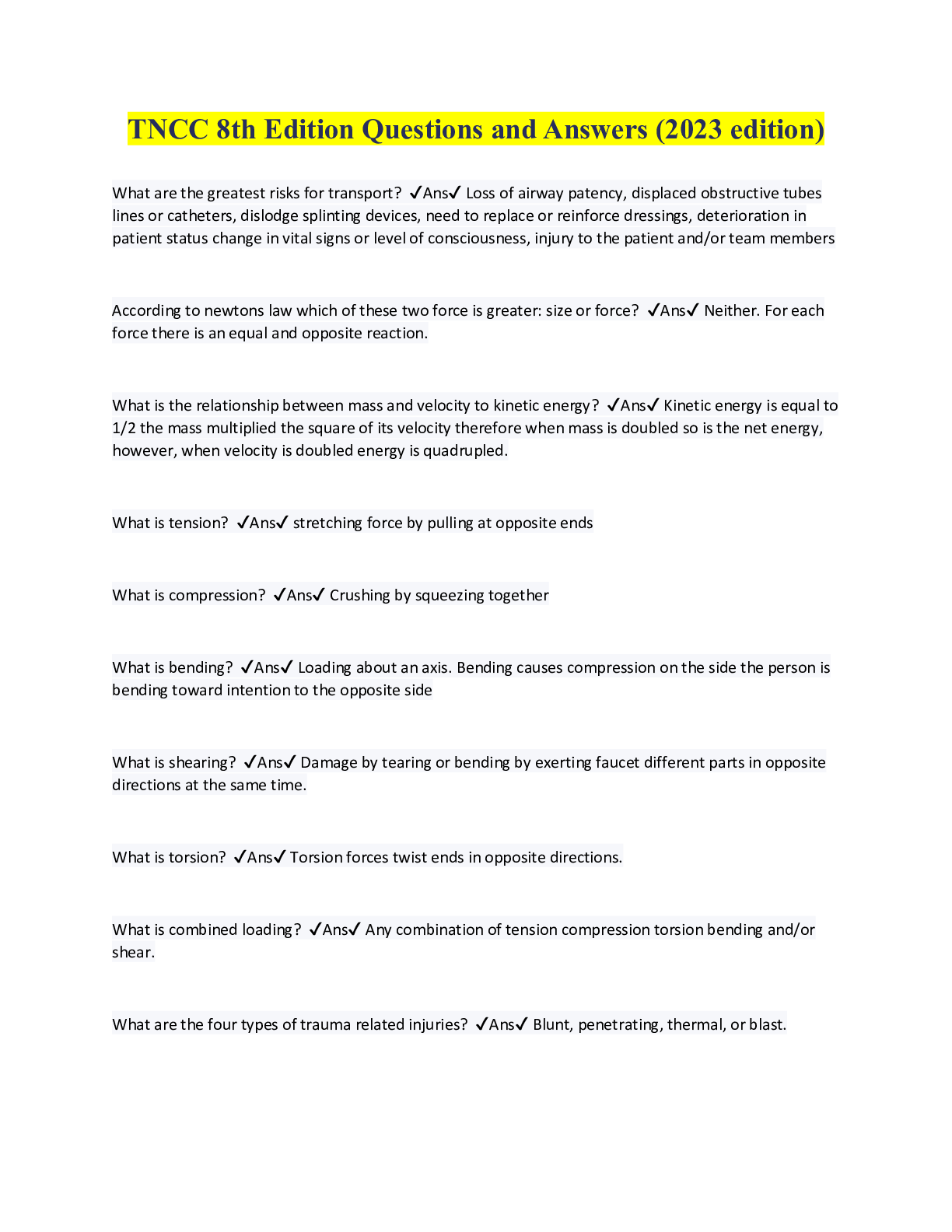
.png)
